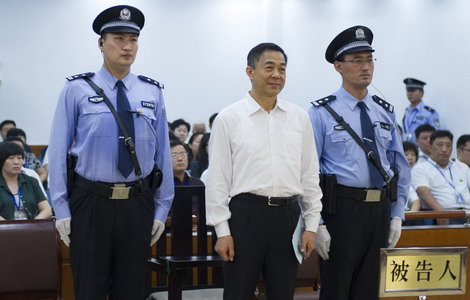Courts embrace social media
Updated: 2013-09-23 08:26
By Hou Liqiang (China Daily)
|
||||||||
The growing use of social media by courts is in line with efforts by China's top judicial body to better open up the trial process to the public.
Over the past two years, courts in at least 17 provinces and municipalities experimented with releasing real-time updates via Sina Weibo, a Twitter-like service, during trials.
A recent example was during Bo Xilai's trial, when the court in Jinan, Shandong province, posted details of the ongoing proceedings, although even a county court in the Guangxi Zhuang autonomous region tested the method with a property dispute.
The Supreme People's Court and the Party's leadership have been active in promoting real-time updates, according to Chinese media.
Zhou Qiang, president of the Supreme People's Court, vowed "a full implementation of the principle of judicial publicity" in an article in Qiushi Journal, a political periodical run by the Central Committee of the Communist Party of China.
"Not only the gates of courts should be opened," he wrote. "More media for judicial publicity should be created and made full use of."
At a symposium for presidents of high people's courts, on July 4 in Changchun, the capital of Jilin, the Supreme People's Court also proposed that courts "should greatly strengthen judicial justice, promote judicial publicity and credibility".
While the real-time updates have won praise from the public, some legal insiders have called for specific definitions of what cases it is appropriate for, review procedures and technical manuals.
"Generally speaking, real-time updates will do more good than harm," said Wang Gang, deputy director of Zhang Jinlong Law Firm in Hebei province. "But not all cases can be broadcast live."
It is necessary to summarize the experience of live updates to make it more standard, he added.
Most Viewed
Editor's Picks

|

|

|

|

|

|
Today's Top News
Verdict of Bo Xilai: Life in prison
Amber alert across Asia, but not red
China signs 12 deals with Venezuela
Russian embassy to Syria shelled
Gunmen holding hostages in Nairobi
Bo Xilai gets life in prison
China braces for super typhoon Usagi
New Sino-US ties sought
US Weekly

|

|













